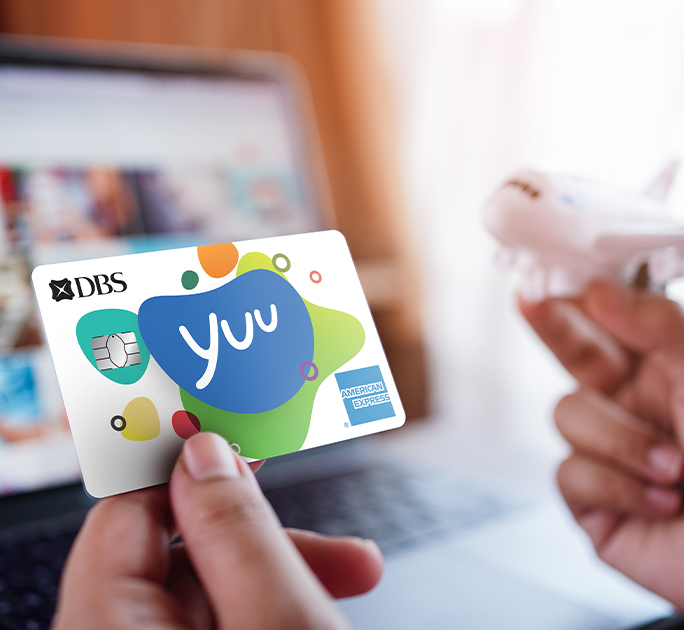Applying for your first credit card?
![]()
If you’ve only got a minute:
- A credit card allows you to make purchases on the spot but you will be required to make payments within a pre-determined period of time, if not you will face interest charges.
- Credit cards often come with benefits like cashback, rebates, and air miles.
- Exercise responsibility in ensuring that you monitor your monthly statements and make payments in full and before the due date.
![]()
In our world where convenience is key, everything seems to be at our fingertips – be it searching for information, making dinner reservations, online shopping and so much more. It goes without saying then, that when it comes to payment methods too, we want to have a fuss-free experience.
Here is where the credit card comes in handy. If you don’t already have one, you might be wondering about your eligibility, the pros and cons of them, or even which to choose from the vast selection available.
Credit cards can be a useful financial tool when utilised wisely. Here’s what you should know before getting your first credit card.
What is a credit card?
A credit card allows cardholders to borrow funds to pay for goods and services with retailers who accept card payments. The cardholder will then be required to repay the borrowed funds, with any applicable interest at a later date. They also come with loyalty or reward programs that enable you to exchange credit card points for gifts and rewards.
Are you eligible for a credit card?
While different cards and financial institutions have different requirements, these are the most common:
- Minimum age – At least 21 years of age
- Required minimum annual income – Minimum gross annual income of at least $30,000 for Singapore citizens/PRs or $45,000 for foreigners.
- Good credit history – Some cards require a specific number of years of good credit history
Popular types of credit cards
There are several types of credit cards available, each with its own benefits. The 3 broad categories available are cashback, rewards points, or air miles. You can choose one or more suited to your lifestyle and usage to maximise your potential benefits.

Cashback/rebates credit card
Users of Cashback credit cards are rewarded with rebates of a small percentage of the amount that they have spent. The cashback amount accumulated on your credit card will continue to add up until you decide to redeem the amount. By using the cashback card, you may get rebates for dining, petrol, utilities, travel, and shopping, amongst others.
There are cashback cards that require a minimum spend and some that don’t. For cashback cards that require a minimum spend, you will only get your cashback if the minimum spend is fulfilled.
A simple way to reach the minimum spend amount is to put your fixed monthly expenses on the card and pay the card balance in full before the due date. These expenses could include your utilities bill, insurance payments and/or your gym subscription.
Rewards credit card
By making your purchases using a rewards credit card, you get to earn reward points. The earned points can be used to redeem products or vouchers from partner companies. Do take note that different banks offer different reward programs, with each bank offering a different point system.
Air miles credit card
For every dollar spent using the air miles credit card, you will earn air miles. Minimum spending is usually not a requirement for the air miles credit card. Neither will there be any caps on miles earned. Hence, the air miles card is perfect for those who travel often and wish to collect miles to upgrade their seats or redeem discounted air tickets.
Choosing the right credit card for you
With such a wide range of choices, it can be hard to choose the right credit card. So, let’s start with the kind of lifestyle that you lead. Are you someone who spends mostly on dining out or grocery shopping? Perhaps, you are an avid traveller who loves to see the world?
Rewards
Depending your lifestyle, you may desire different perks and benefits. For example, Max is a young executive who frequently shops online and spends his time dining at chic restaurants. Going for a credit card that offers online shopping and dining benefits would be beneficial to Max. The DBS Live Fresh Card is one such card that will be able to provide up to 10% cashback. This translates into 5% online and Visa contactless spend, with an extra 5% on green cashback eco-eateries, retailers, and transport services.
From the perspective of Adam, a young parent, the key essentials for him are grocery shopping and utilities. Therefore, Adam would be looking for a different type of card to suit his needs. In this case, the POSB Everyday Card might suit him better. With the myriad of benefits available such as cashback and discounts on dining, utilities, groceries, and shopping amongst others, Adam would be able to benefit more from the usage of this card.
For Eve, an avid traveller, earning miles is important to her. Hence, she would be looking for a credit card that will aid her with earning miles. The DBS Altitude Visa Signature Card is one such card that will benefit her by providing her with miles for every dollar she spends using the card.
Fees
The amount of annual fees charged depends on the credit card. There are credit cards that do not charge annual fees, while others do. There are also credit cards that do not charge annual fees until the second year of membership. Nonetheless, a credit card with zero annual fees doesn’t mean that it is better than those which charge annual fees. Do compare the benefits of each card.
It is also an open secret that you might get a card waiver simply by asking the bank for it – why not try and see if you get to enjoy some savings?

Tips on using your credit card responsibly
Having good habits to manage your credit card is important. Here are some tips and tricks to help you.
Pay back the entire bill monthly
The minimum amount to be paid is usually 3% of the outstanding or $50, whichever is higher. Regardless, it is always prudent to pay back in full and on time. By doing so, you will avoid late payment penalties. Besides, accumulating debt can snowball and can quickly become a large amount over time due to the recurring interest.
Only buy what you can afford
Using a credit card can make you feel like you have unlimited cash. However, always keep it mind that you should only use the amount that you can afford. Not being able to pay the monthly fees can lead to accrued interest on your credit card balance.
Buying without limits can also form a bad habit and it could quickly go out of control without you realising it.
Monitor your monthly bill statements
As a credit card holder, tracking your expenditure is important for 2 reasons.
Firstly, to ensure that there are no payment discrepancies in your statement. If you find a charge for something you did not pay for, contact the credit card company or charging company to try and resolve the issue.
Secondly, reviewing your expenditures regularly is a good practice to ensure you remain within your budget. You can also use DBS digibank to track your expenses and goals.
Avoid taking cash advances
It can be tempting to take up a cash advance on your credit card when you feel like you need the cash. However, cash advances come with high fees and interest rates. Often, the fees and interest rates are higher than regular credit card rates which range from 24% to 26%. Hence, you should consider other methods, such as getting a deferment on your bills, getting a personal loan, or a line of credit which can be more cost-effective.
Stay below your credit limit
It is prudent to always monitor your expenditure and stay below your credit limit. This ensures that you stay on budget with your expenses and can repay your loan promptly.
All in all, getting your first credit card can be an exciting and emotional journey for you. Nevertheless, taking on this new responsibility can teach you to make financial decisions. Ultimately, having a credit card can be beneficial to you in many ways as long as you practice good credit habits.
Ready to start?
Speak to the Wealth Planning Manager today for a financial health check and how you can better plan your finances.
Alternatively, check out NAV Planner to analyse your real-time financial health. The best part is, it’s fuss-free – we automatically work out your money flows and provide money tips.
Disclaimers and Important Notice
This article is meant for information only and should not be relied upon as financial advice. Before making any decision to buy, sell or hold any investment or insurance product, you should seek advice from a financial adviser regarding its suitability.








That's great to hear. Anything you'd like to add?
We're sorry to hear that. How can we do better?